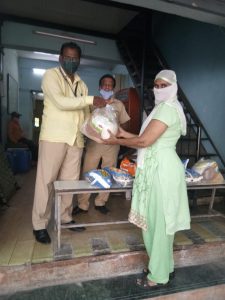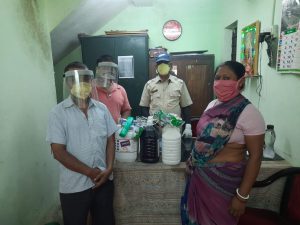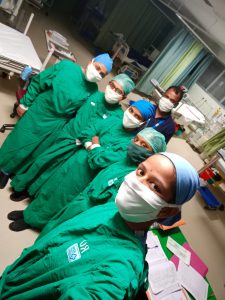By Yardi Blog Staff on June 25, 2020 in Giving Global
Yardi Vasti Vikas Prakalp (YVVP), Yardi’s dedicated corporate social responsibility project in Pune, India, supports NGOs and implements direct interventions in urban communities (vastis) of Pune city. As the global COVID-19 pandemic has impacted India severely, YVVP has pivoted to help.

Normal field visits to the vastis halted when a lockdown to prevent COVID-19 spread began in late March. The CSR team switched to using virtual platforms to stay connected with beneficiaries and stakeholders, to understand the situation on the ground and address unprecedented issues. This has presented various challenges. Many vasti residents do not have smart phones, internet access or resources to recharge phones.
“Lockdown restrictions in congested spaces combined with loss of jobs have created high levels of fear, anxiety and frustrations among family members, in addition to hunger,” said Bharati Kotwal, head of CSR at Yardi Pune. “Our stakeholders in vastis, such as community mobilizers, sanitation committee members and youth leaders have helped us to identify the neediest families and do what we could to relieve some of the distress.”
Aiding with sanitation and sustenance needs
YVVP has provided relief to vasti residents in two significant ways during lockdown:
- Provided dry ration kits (food and grocery items) to families identified through the YVVP field team and NGO partners.
- Supplied masks, sanitizer and sanitary pads to those isolated in shelters located in municipal schools.
“We provided dry ration kits to over 2800 households in three months through NGOs or by procuring items directly and distributing them ourselves,” Kotwal said. “Though NGOs, foundations, individuals and Pune Municipal Corporation (PMC) were providing similar help, we could reach those who were left out because of our connections in the vastis.”
Keeping community toilets clean and functional is one of the largest efforts of YVVP. The project covers 556 community toilet blocks (CTBs) in 226 communities where most families do not have toilets in their homes. Community participation and municipal coordination make this effort possible.

To mitigate virus risk, cleaning frequency of the blocks has been heightened and the supply of cleaning materials must be augmented as well. Simultaneously, the cleaning staff has lost income from normal user fees, as most vasti residents can no longer afford a small fee to use the toilet blocks.
“To help ensure that the caretakers continue their work and do not face starvation, YVVP distributed enough groceries to feed families of four for a month to 250 caretakers in April, May and June,” Kotwal said.
Continuing education efforts

The YVVP health team has also continued to conduct Life Skills Education sessions with peer educators and more than 600 girls on health, nutrition, social awareness, mental health and stress management. The team has been using phone calls and WhatsApp to counsel the parents of roughly 500 malnourished children who were being treated in community camps organized by YVVP prior to the lockdown.
The YVVP education team organized four webinars for PMC teachers on “Mental Health During COVID-19 Pandemic” by a well-known psychologist. Around 200 teachers, along with senior education officials, attended the sessions.
“Sixty peer educators, who play an important role in broadening the reach of YVVP’s efforts, also joined the webinar and will pass on the knowledge to others,” Kotwal said.
The education team has also been helping the PMC communicate with parents, so that they will send children back to school when schools reopen. School enrollment is expected to drop, as many migrant laborers have returned to their home villages. Education team members have started regular online training sessions and discussions with youth and have encouraged them to identify and support other vasti families who need assistance.
Next steps and resuming vasti visits
“Skill development and income generation during lockdown is emerging as a major challenge,” noted Kotwal. “Vasti-based courses had to be stopped for now.”
The vocational training team is coordinating with local training institutes to identify short term courses which can be conducted online, such as digital marketing, job readiness, business correspondence and GST Accounting, with more to come. So far, 150 participants are benefitting from the online courses and many more will surely join as the classes continue.
As India begins to lift lockdown restrictions, the CSR team has started field visits again as of June 1, while observing precautions such as wearing masks, using hand sanitizer and cleansers, and keeping physical distance. While modifications due to current circumstances will continue, YVVP will continue to be highly visible in the vastis, doing everything it can to help.


